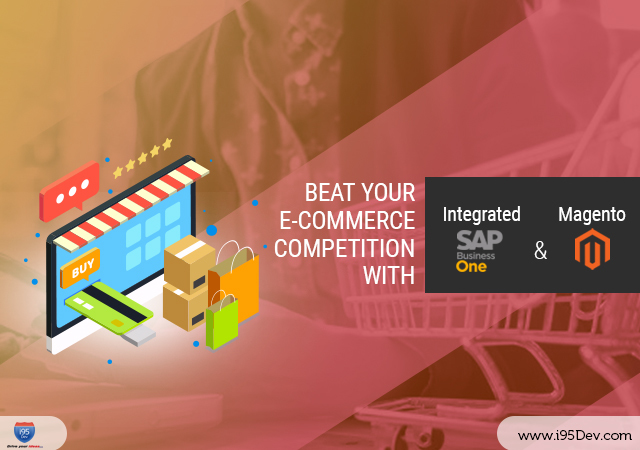Beat Your eCommerce Competition
with Integrated SAP B1 and Magento

There were 1.66 Billion Global Digital Buyers in 2017. It means 21.8% of the World’s population buys online, and in 2021, the number is expected to rise to over 2.14 billion. What do these numbers mean for your e-commerce business? On one side they reflect the potentiality you can leverage on and on the other, they mean more challenges to stay in the race. Wouldn’t it be great to expand your customer base and grow your business? If you would like to gain an understanding of the problems you would be facing, here is a list of the challenges.
Business challenges of e-commerce
Meeting customer expectations
By 2021, e-commerce sales are expected to reach 17.5% of retail sales worldwide. It has now become critical for you as an e-commerce business to optimize your e-store. The kind of experience your customers go through plays a vital role in deciding the growth of your business. Though e-commerce companies strive to provide a great customer experience, many a time, they fail to meet customer expectations.
Operational inefficiencies
Most e-commerce companies face a lot of issues when it comes to running the e-store. The problems in operations are as follows.
Effective order management with Split Orders
The most common challenges the e-commerce companies face is the delay in the delivery. This could be due to the improper coordination between the various systems they use. The items inventory is not updated constantly that paves way for taking orders of items that are out of stock. This, in turn, leads to the delay in delivery of the product. One way of handling this is to split the orders. Order splitting can actually help improve the customer experience without affecting your business.
Packaging and logistics
Though it may seem to be a tiny aspect, packaging and logistics carry greater weight in the customer experience. Damaged or goods with no proper packaging are frowned upon by many of the customers. Also, the extra cost the customers have to incur towards logistics can lead to shopping cart abandonment by international customers. So, providing a great shipping experience by optimizing the cost can be advantageous.
Managing uniformity of information
Any e-commerce company handles large data across different systems. The data has to be uniform across all the systems for the smooth running of your e-store. The difference in the data across different systems results in the miscommunication of the existing data to the customers, affecting the customer experience.
In spite of these challenges, we believe integrating SAP B1 and Magento e-commerce platform will solve these issues for you. Here is how you can strengthen your business and gain a competitive edge.
How to leverage integration to beat the competition
We have mentioned above that integration can help you beat your competition, but you might want to know how.
On time delivery
With integration in place between your SAP B1 and Magento systems, you will be able to handle your logistics better. You can minimize the delay in the delivery of the product. Integrating the two systems facilitates the free flow of data across both the systems with the help of the connector.
Inventory cost reduction
You can take a look at the updated sales information by integrating Magento with your SAP B1 ERP. The connector helps SAP B1 system to stay updated with all the e-store transactions. The updated sales information and inventory helps you make more informed decisions. You can make forecasts and plan inventory accordingly, which reduces the operational cost. Magento SAP B1 integration helps you track inventory real-time and helps you decide on how much inventory you would need further.
Financial reports generation
E-commerce application helps you create financial reports on sales. By integrating your SAP B1 with the Magento e-commerce platform, you can stay a step ahead in your financial planning. Integration enables transparency of financial information across the organization. The transactions reflected across the systems and SAP B1 provides details of the balance sheet, cash flow, trial balance etc.
Increase productivity and save time
E-commerce ERP integration streamlines different business processes leading to the reduction in the human resources and efforts in the business processes. It also reduces the manual effort as the employees no longer have to manually enter the data from one platform to the other. You can automate communication across the platforms. This saves both time and cost and helps the employees focus on more important things. In addition, the orders also get synced into the SAP B1 system from Magento. The person handling ERP can instantly start the further process reducing the order fulfillment cycle.
Reduces Data Redundancy and Error
Integrating both the systems enables two-way sync of the data like the customer details, order details, payment, and shipping information. Secondly, the item and inventory details can be updated from SAP B1 to the Magento platform reducing the time and efforts of re-entering the data. Since it involves no manual intervention for entering the data, there is a zero chance of error.
Increase your CX
Integration also helps you notify your customers about the order updates. It provides the customers’ real-time product information, availability of the inventory, tracking of the orders etc. on the e-commerce platform from SAP B1 ERP. Your customers can track the shipment details. These real-time updates add to the customer experience (CX) as the customer is informed about what is going on. You can improvise your CX with real-time updates.
Conclusion
By now, you must have understood how much easier it would be if you integrate your SAP B1 and Magento platforms. You can increase your sales with one simple motto “happy customer” and integration provides an opportunity for you to satisfy your customers. i95Dev provides a customized integration considering your business requirements. Talk to us today if you want to gain a competitive edge.



